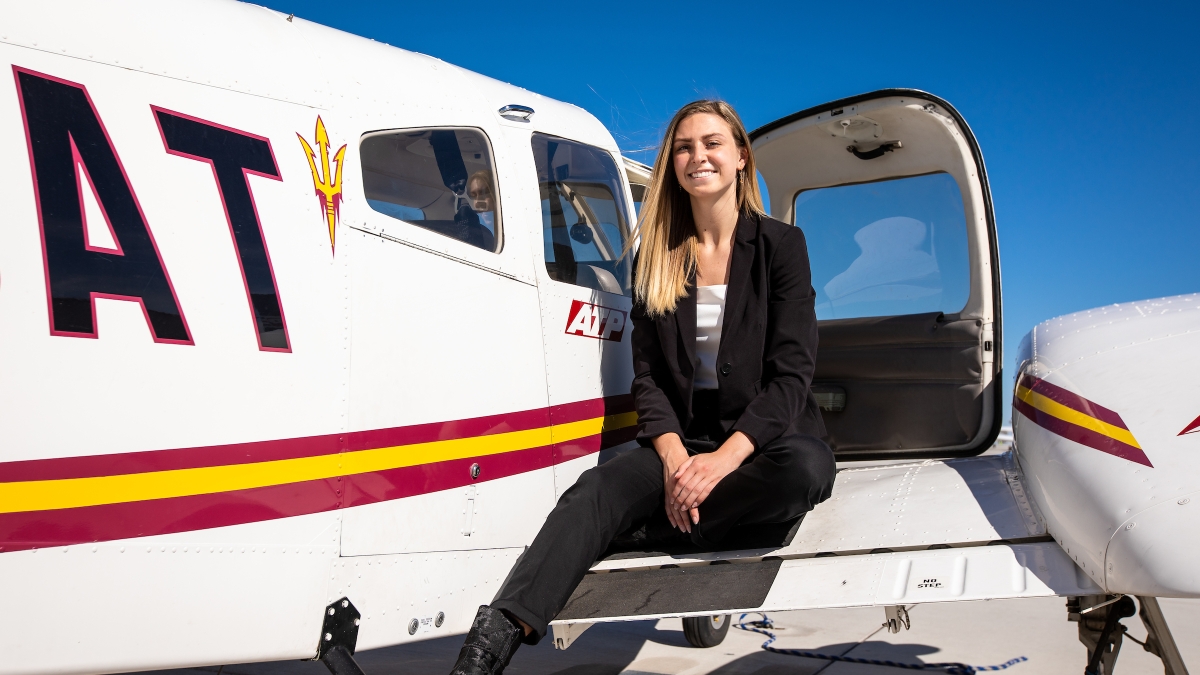Editor’s note: This is part of a series of profiles for spring 2019 commencement.
Parents of a friend of Carlee Cramer’s flew for United and Southwest. They told the Houston native she should check out flying. Her parents paid for a discovery flight, where a pilot takes a passenger up for about an hour and goes for a local flight.
“I did that and it was a spark kind of thing,” Cramer said. She was hooked right away.
“They say it’s ‘the bug,’” she said. “You got ‘the bug.’” She earned her private pilot’s license her senior year in high school and now she’s graduating from Arizona State University with a BS in aeronautical management technology (professional flight) from the Polytechnic School.
Cramer led the ASU chapter of Women in Aviation International for two years; it has 35 members this year, up 10 from the previous year.
The newly minted aviator has an internship with United Airlines which starts in May. After her training ends in August she’ll begin flying small planes and building flight hours. “They consider it a four month interview,” she said. “Once you get the hours you need, then you’ll have an interview. It’s a foot in the door.”
Question: What’s something you learned while at ASU — in the classroom or otherwise — that surprised you, that changed your perspective?
Answer: Being president of Women in Aviation changed it because it taught me how to prioritize between school and being the president and scheduling events and tours and things like that. It also helped with my involvement with everything. It taught me not necessarily to be involved, but how much I want to be involved. In the future I want to be involved with ASU and do a mentorship program and be an active alum.
Q: Why did you choose ASU?
A: Me and my family were looking into schools. … We stopped here in the summer when there was no one in town, no one was really around. … We really only saw the SFDC (Sun Devil Fitness Complex). Loved the fitness center. Then we walked the five minutes it takes to get to the airport and fell in love because to have a commercial airport literally a five minute walk from campus was incredible. After the initial tour I did more research on it. The program itself is amazing because the classes they have are not necessarily what everyone else has. We have the structures class, power plants. Our capstone class is in a CRJ 200, so this semester I’ve done 12 lessons in a CRJ simulator to help practice for when I get to a regional airline, so it’ll help me further my career and be somewhat ahead of the other applicants. That was amazing.
Q: Which professor taught you the most important lesson while at ASU?
A: That would have to be Marc O’Brien. I had several classes with him: commercial pilot, multi-engine stuff, and then private pilot. Basically he taught me you can do anything; don’t limit yourself. He’s been super-supportive and he’s always been a positive influence my three years here.
Q: What’s the best piece of advice you’d give to those still in school?
A: It’s kind of what my parents have told me. I consider it great information. It’s like a code almost. Plan the work and work the plan. Plan out what you’re going to do and just do it. Set yourself up for success in a way.
Q: What was your favorite spot on campus, whether for studying, meeting friends or just thinking about life?
A: I work in the director’s office, but it’s my favorite place by far. Anna Wales and everyone in that office is seriously amazing. They’re so enthusiastic, not only about their jobs but the campus and the school itself.
Q: If someone gave you $40 million to solve one problem on our planet, what would you tackle?
A: Environmental aircraft propulsion. Aircraft now are jet turbines and they’re not the most environmentally friendly. The new propulsion systems are electric, hybrid-electric, ion thrusters — which is crazy — and turbo-electric, so it will make it more fuel-efficient and the noise levels will be reduced. … That’s what I would go towards.
Photo: Carlee Cramer will soon graduate with a degree in aviation management technology (professional flight), and will head to Denver for an internship with United Airlines. She has served two years as the ASU branch president of the Women in Aviation. She poses with a Piper Seminole at Phoenix-Mesa Gateway Airport on April 18, 2019. Photo by Charlie Leight/ASU Now
More Science and technology

ASU professor breeds new tomato variety, the 'Desert Dew'
In an era defined by climate volatility and resource scarcity, researchers are developing crops that can survive — and thrive — under pressure.One such innovation is the newly released tomato variety…

Science meets play: ASU researcher makes developmental science hands-on for families
On a Friday morning at the Edna Vihel Arts Center in Tempe, toddlers dip paint brushes into bright colors, decorating paper fish. Nearby, children chase bubbles and move to music, while…

ASU water polo player defends the goal — and our data
Marie Rudasics is the last line of defense.Six players advance across the pool with a single objective in mind: making sure that yellow hydrogrip ball finds its way into the net. Rudasics, goalkeeper…


